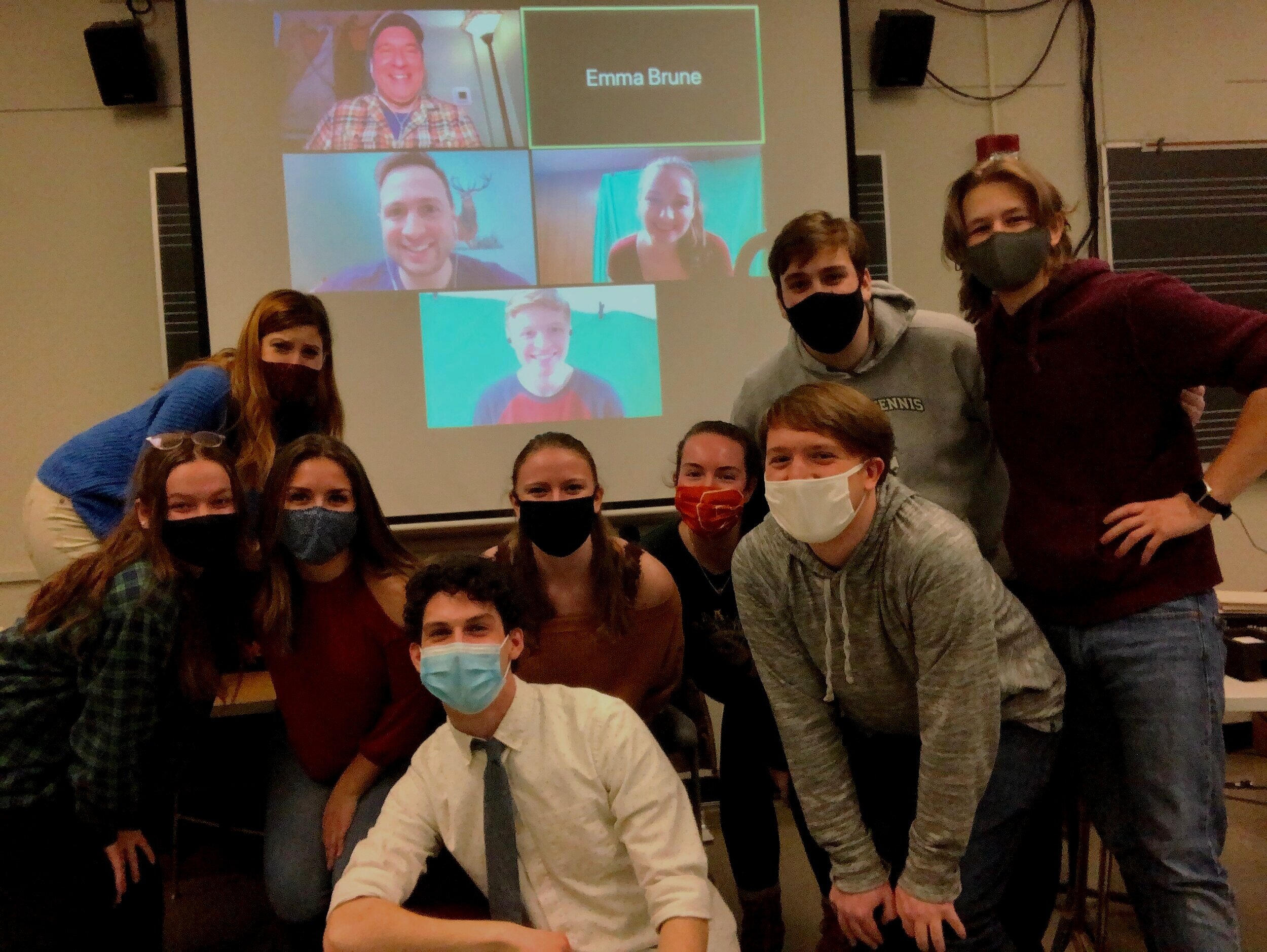The cast of “I Love You Because,” pictured above, met virtually and in-person according to social distancing guidelines. Main cast members and stage crew met in-person, while director Scott Scaffidi, musical director Don Kot, and two other cast members ‘zoomed in’ to rehearsals and recording sessions. (Courtesy of Kathryn Berton).
Logo for “I Love You Because” at Geneseo. (Courtesy of Kathryn Berton).
Geneseo’s musical theater program presented three virtual showings of the musical “I Love You Because” from Friday Feb. 12 through Sunday Feb. 14. The lovey-dovey atmosphere of Valentine’s Day complimented the modern dating dilemmas central to the musical, which was carefully filmed and edited into a movie for the pleasure of the viewer.
This musical was filmed over a total of 16 days in early January and edited in the following weeks, mainly by students. Leadership included director Scott Scaffidi and music director Don Kot, who ensured that social distancing guidelines were upheld throughout the process.
“I Love You Because” is a musical rom-com that debuted in 2006. The plot is purportedly based on Jane Austen’s novel Pride and Prejudice, though the only significant parallels seem to be the characters’ names and the conclusion that you must love a person for their flaws—rather than despite them.
“I Love You Because” follows four main characters, eventually paired off into love matches. The first pairing is an enemies-to-lovers plot. The individuals involved in this match are Austin Benett—played by musical theater and communications double major senior Carl Treiber—and Marcy Fitzwilliams—played by musical theater major senior Kayla McGallian. The second relationship is a sort of friends-with-benefits situation … until someone catches feelings. The parties involved in this second relationship are Jeff Bennett—played by musical theater major senior Will Snyder—and Diana Bingley—played by musical theater major senior Sandra Kralik.
Musical theater and communications double major junior Marianne Maysuch and musical theater major junior Jacob Anspach are both actors with multiple roles in this musical. Their parts culminate into a type of Greek chorus commentary, despite appearing as random and apparently separate individuals. Maysuch and Anspach play characters who provide comedic relief, interfere with their personal match-making schemes and begin a dialogue around the musical’s two main relationships.
Anspach noted that he and Maysuch were edited into the production rather than acting in-person with the four main characters.
“[Maysuch and I] were shooting from our apartments,” Anspach said. “The [musical theater] major gave us green screens and ring lights and an audio system, and we took our iPhones and we put them in the ring lights. We filmed ourselves both with video recording and audio recording, and they would take our filmed versions and kind of put [them] in throughout the scene.”
As a result, Anspach and Maysuch would pop up periodically in the production, seeming to look and speak to their in-person costars despite having filmed in a separate location.
“We did our scenes over Zoom, so we could still do the scenes with the [in-person actors],” Maysuch said. “It was very different to doing a normal musical. We would rehearse the scene and then the next day we would record it. I really had to be on top of it, and it was a pretty fast process. The outcome is also very different—not doing a live show, you know, just streaming it. The whole editing team did so much work in this process. I'm glad that we got to do it, and that it worked out so we could actually do a musical when a lot of places are struggling to do that.”
The experiences of the four main characters were slightly different from those of Maysuch and Anspach. Treiber, McGallian, Snyder and Kralik chose to enter a quarantine bubble with a few crucial crew members in order to film their scenes.
“We had like two studios,” Kralik said. “One studio [was the set for] both apartments. The apartments looked a little different but were still in the same space, which kind of resembles what it's like to do a show on the stage, where the action might be in the same space but you just kind of change a few of the props and stuff [for different settings]. Our second studio was a green screen, so [in the production] you will see that sometimes we look like we're in Central Park or in a bar.”
Unlike most stage productions, the technology inherent in a virtual production allows for the opportunity to pre-record musical numbers.
“We sat in a studio and recorded some songs, and then the audio editing team went in and put it together,” Kralik said. “The rest of the musical’s songs were all done live, in the room, so they might sound a little different than pre-recorded songs. So, we still tried to incorporate live singing—well, we got to have a few takes with it, which was a new kind of experience—and we tried to resemble the stage and an in-person show as much as possible.”
The actors involved in “I Love You Because” were not privy to the full, edited production before it was released by the school for Valentine’s Day weekend.
“We get to see it at the same time that everyone else does,” Snyder said. “The only times I really got to know if any of my lines were funny was when we were running the scenes in-person. The camera and audio crew would see it for the first time when we would rehearse it, so if they giggled while they watched, I was like ‘okay, well I made a good choice there.’”
Despite the many challenges in the way of the musical theater department, “I Love You Because” prevailed and was released on time for various virtual viewers. Well done, musical theater majors. We love you because of your dedication to your craft.



